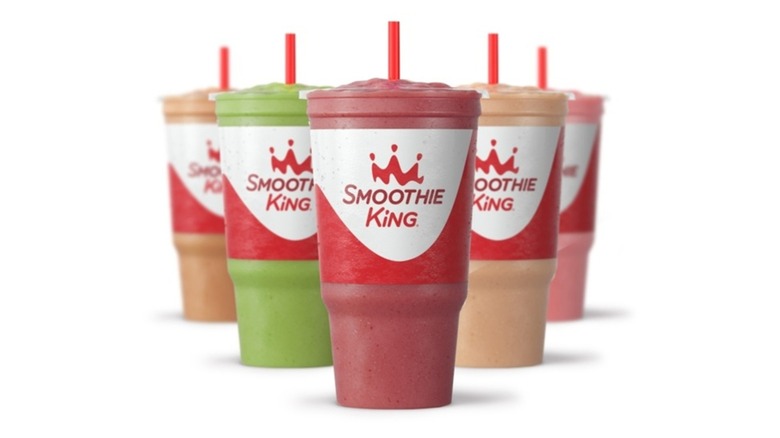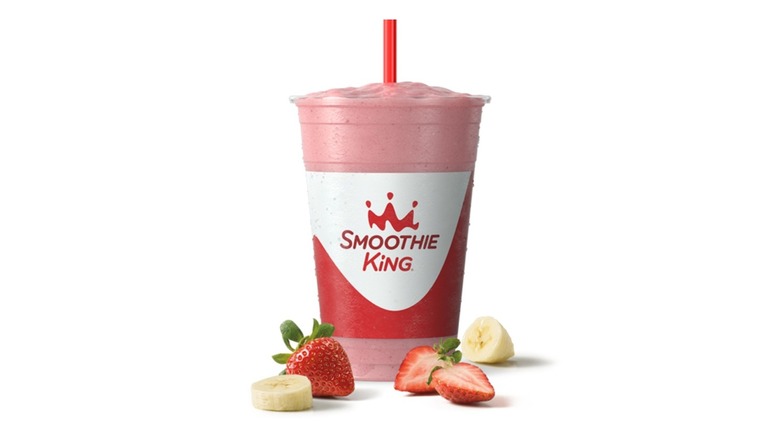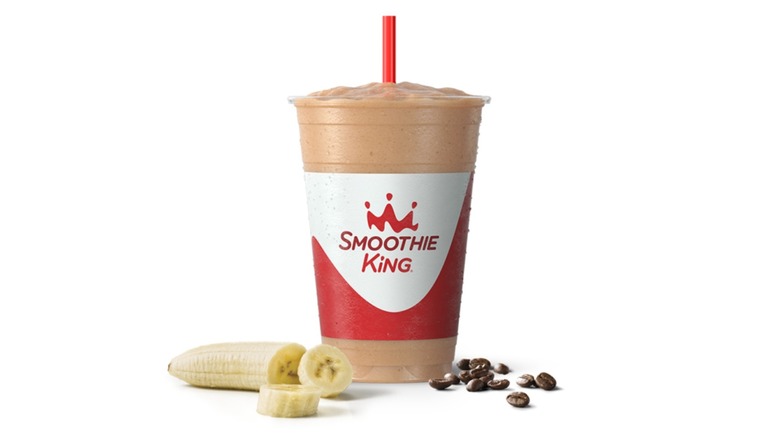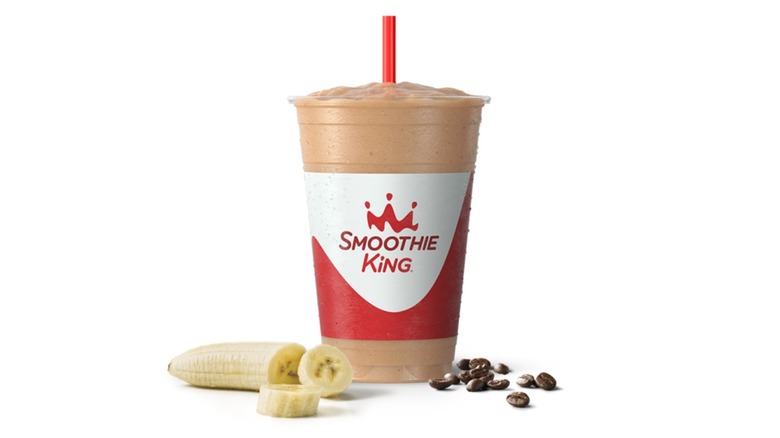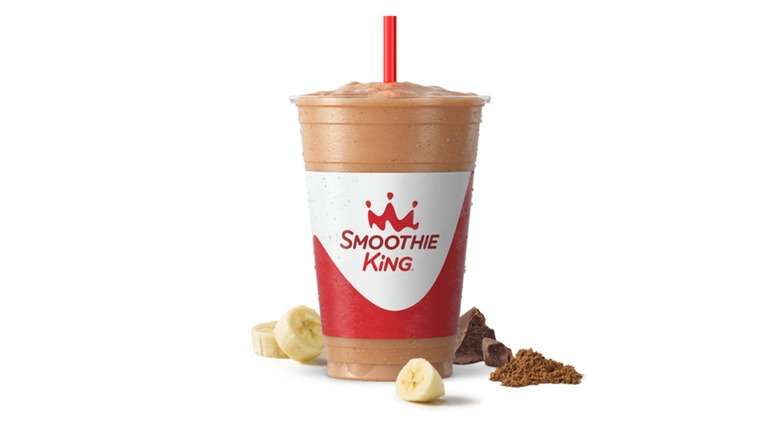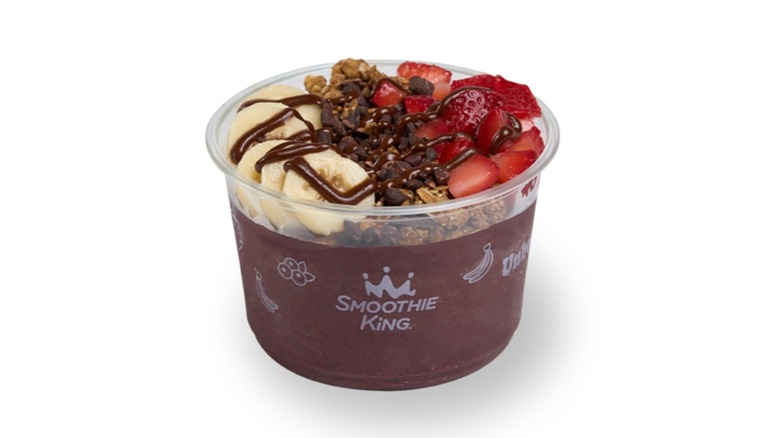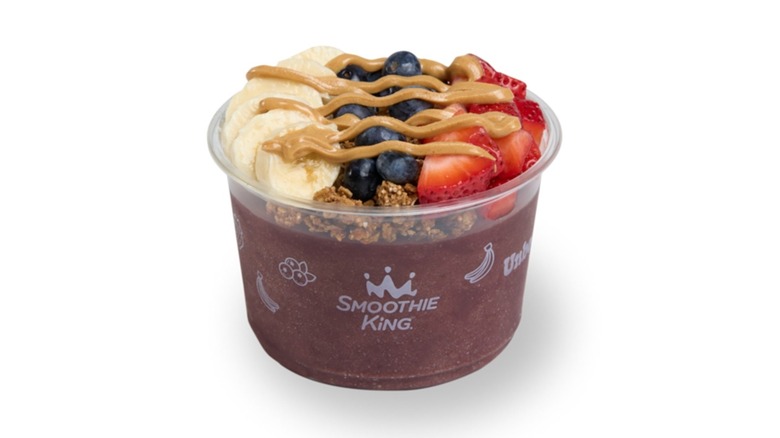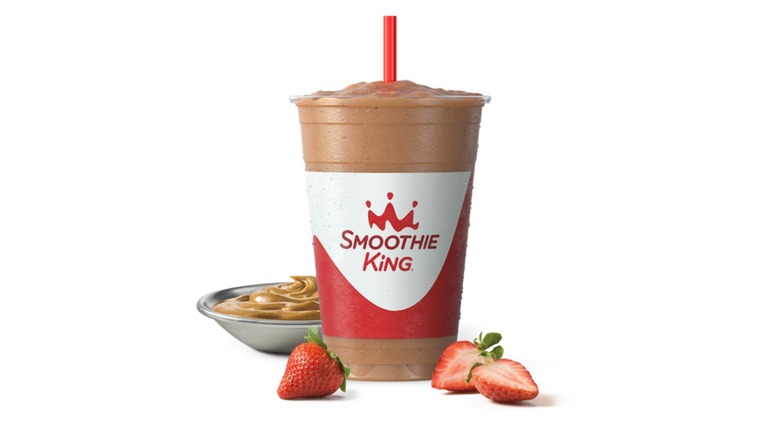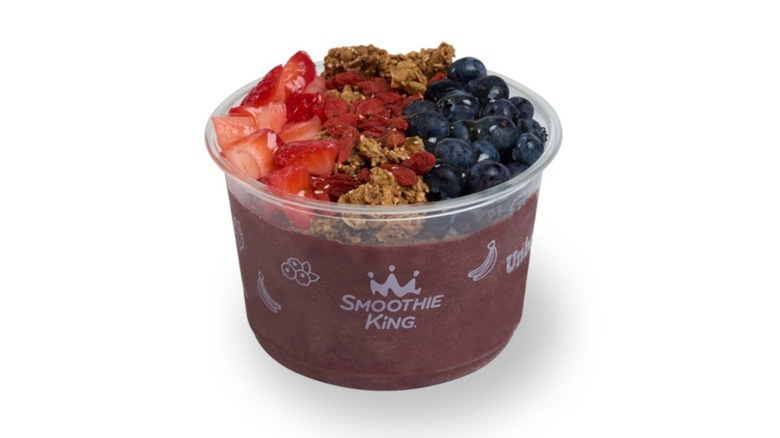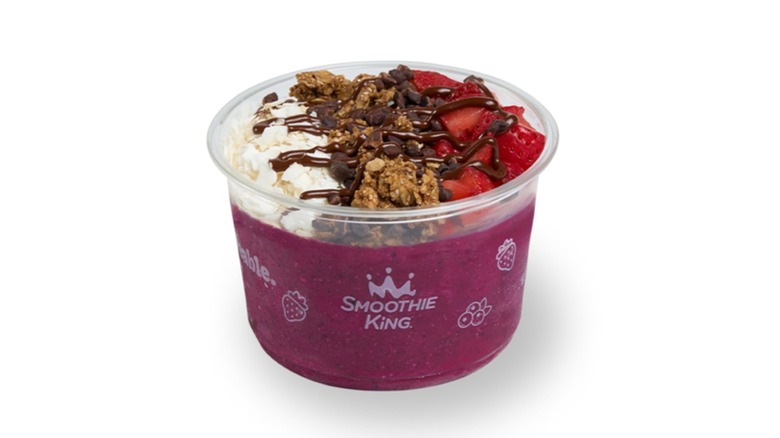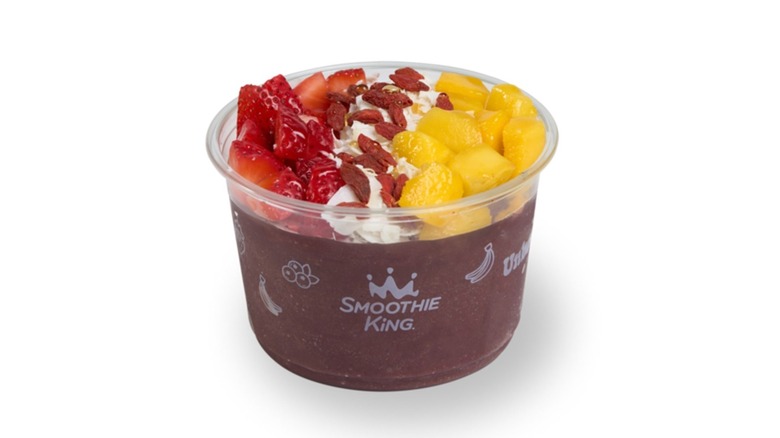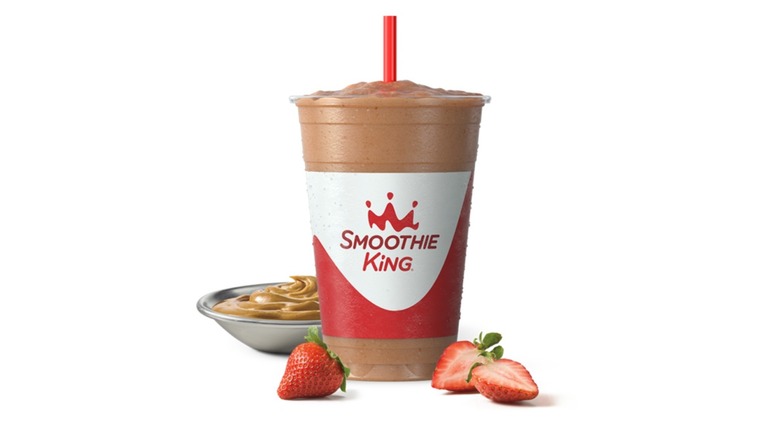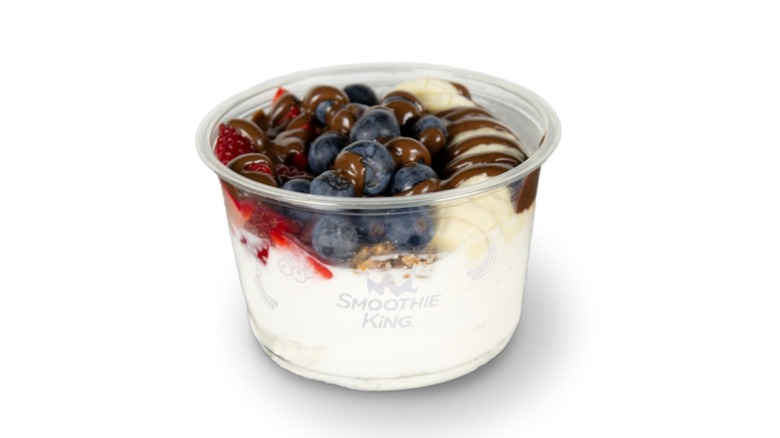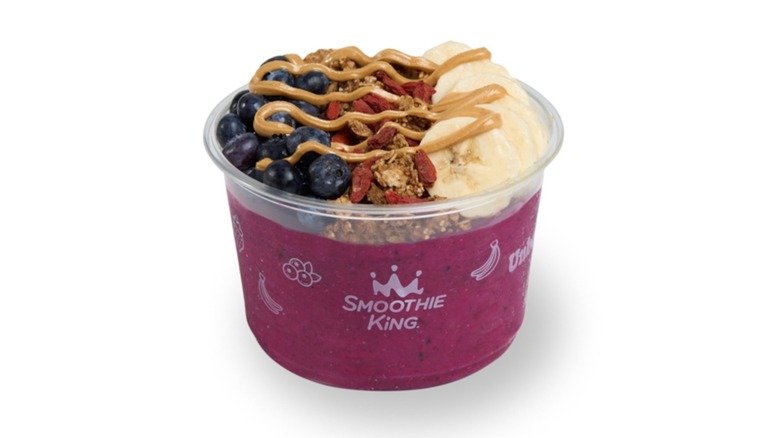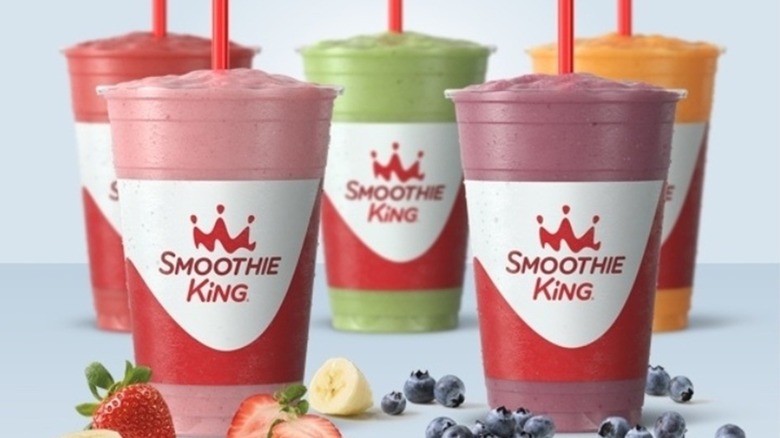The Unhealthiest Things You Can Order At Smoothie King
Smoothie King may rule when it comes to smoothie chains offering a suite of sumptuous sips, but that doesn't make every option on the menu a prime choice in the realm of nutrition. Though the company's creations aim for the sweet spot between delicious and nutritious, there are plenty of items that land squarely in one court or the other. When flavor and enjoyment outweigh keeping your macros in check, you can run into a real battle where sugar, fat, and calories wield a mighty sword against vitamins, minerals, and protein. The truth about Smoothie King is that some of the creations on the menu pack in as much unhealthy content as a straight-up milkshake, a composition that no splash of potential nutritional magic can counteract.
Which members of the royal ranks are the worst Smoothie King items when it comes to prioritizing sweet fun over sensible consumption? I ran through the nutrition facts to find out how the formulations shake out so I could identify the unhealthiest items you can order. They all sound like serious treats, for sure, but their outsized calorie count, fat content, and sugar concentration take them beyond the walls of the health world. Next time you're before the King trying to make a sensible decision, keep in mind that these less-than-favorable representatives from the kingdom are orders to think twice about.
The Hulk Strawberry
With 770 sugar-filled calories on deck in a 20-ounce small cup, The Hulk Strawberry is an appropriate name for this creamy colossus. More of a dessert than a health drink, upsizing to a 32-ounce medium gets you 1,120 calories, while a 44-ounce large piles it on with 1,530 calories. This is all before you get the chance to customize the recipe with add-ins that only make those numbers grow. And with a small serving amounting to 22 grams of fat, 80 milligrams of cholesterol, and a pancreas-scorching 121 grams of sugar, this Hulk is set to smash your nutritional ideals into tiny, health-compromising pieces.
Sure, the ingredients listed show turbinado, a less-processed sugar that helps minimize the impact of the more highly-refined sweetener. But there's also butter pecan ice cream in the mix, which only adds to the sugar situation ... and the fat situation ... and the calorie situation. Put succinctly, this is not a situation you want to be in.
The Hulk Espresso
A giant coffee-infused flavor sensation like The Hulk Espresso may sound like a tasty chug when you're running low on energy. But this is another ice cream-laden creation that feels more appropriate at a Sonic drive-up window than a spot that sells supplement-infused smoothies. Pictures of people exercising on the website listing do little to counteract the 650 calories, 22 grams of fat, 80 milligrams of cholesterol, and 90 grams of sugar you'll be taking in if you order a 20-ounce small. Go for the 40-ounce large and those numbers practically double.
And did I mention the caffeine count here? A small order racks up 159 milligrams, which is one-and-a-half times the 95 milligrams in a cup of coffee. Go for the biggest Hulking gulp of all and you get over 300 milligrams, which is an awful lot of caffeine to consume in a single item. Even if you nurse this bodacious beverage throughout the day, you'll still be getting 179 grams of sugar, which is well over the recommended daily allowance of 50 grams for a 2000-calorie-per-day diet. You can subscribe to Smoothie King options that are far more favorable than this.
The Hulk Coffee
If you've ever had a coffee-flavored milkshake, you're acquainted with what The Hulk Coffee offers. Like the other Hulk items, butter pecan ice cream is a key ingredient. While this flavor may be custom-made by Smoothie King for coffee lovers, it's definitely not on the roll call for people who appreciate a healthy swig to go with their mindful lifestyle. A small cup is overflowing with 640 calories, 22 grams of fat, 80 milligrams of cholesterol, and 89 grams of sugar; a 12-ounce can of soda has 40 grams of sugar, for comparison, and nobody except soda companies are advocating to make that stuff a part of your regularly scheduled consumption.
By comparison, a16-ounce Starbucks Caramel Frappuccino (a Grande, for those who know the lingo) gets you 380 calories, 16 grams of fat, 50 milligrams of cholesterol and 54 grams of sugar, with 90 milligrams of caffeine delivered to your bloodstream. And Starbucks makes no claims of their beverages being complementary to your gym routine, unlike Smoothie King and its stock photos of fitness fiends grinding away with this sugary concoction nearby. This isn't the way you want to Hulk out.
The Hulk Chocolate
Melt a bunch of ice cream and pour it into a cup and you have the essence of The Hulk Chocolate, a system-challenging combination of sugar and fat that won't be doing your nutritional ambitions any favors. Reading the nutrition info to find out a 20-ounce version contains 640 calories, 22 grams of fat, 80 milligrams of cholesterol, 90 grams of sugar is enough to convince health nuts that this butter pecan-rich mash-up is enough to shake up their system, no matter how many bananas may be in the blend. This is where consuming chocolate for its health properties goes off the rails.
No matter where you rank Smoothie King on your list of smoothie chains ranked worst to best, you have to admire the moxie of a company that puts vitamin-rich juice blends side-by-side on the menu with beverages like this that have more in common with a Dairy Queen shake than a traditional health smoothie. Is it delicious? Undoubtedly. Is it healthy? Not if you define health as "lower in calories, fat, sugar, and cholesterol than a banana split."
Açai Cocoa Haze Bowl
There's a tendency in the smoothie world to ascribe anything with açai in it as healthy. This is all well and good if the other ingredients in the blender match açai powerhouse profile, something which Smoothie King shoves aside in its Açai Cocoa Haze Bowl. The bowl itself looks innocent enough, with a nest of granola resting atop a silky blend of what the company calls "açai base" and topped with slices of strawberries, bananas, and a spritz of chocolate hazelnut spread. Somehow, this deceptively dense composition delivers 630 calories, 23 grams of fat, and 62 grams of sugar, which hints at the fact that something takes the açai berries In a less than natural direction to achieve a sweeter flavor. What you end up with is a modest bowl of high calorie high sugar snack food that cries out for you to add steps to your daily count in order to burn through it all.
With only one size available, there's no opportunity to reduce your intake of these not-so-healthy macronutrients, though there's also no chance to accidentally increase them by ordering a larger cup. It's not a surprise that the origins of smoothies as nutrient-dense health food would eventually lead to little bowls of sugar-filled questionability like this.
PB Swizzle Bowl
Power-packed peanut butter makes an appearance in the PB Swizzle Bowl, a smoothie you can eat with a spoon instead of slurping with a straw. But the extra substance comes at a cost. Essentially a repeat of the Açai Cocoa Haze Bowl but with peanut butter added, this not so health friendly scooper rings up at 620 calories, 22 grams of fat, and 58 grams of sugar. Surprisingly, even with peanut butter included, the calories, fat, and sugar are all slightly less than the original. But they're still higher than you would expect from such a restricted portion of what could be a more favorable treat.
And perhaps "treat" is the secret to a smoothie bowl like this becoming an occasional indulgence rather than joining your greater nutritional plans. There's certainly no reason you can't enjoy one of these sweet goodies every once in a while without knocking your power tower over. But making such a sugar loaded calorie bomb into a non-negotiable part of your overall eating plan is probably not the best move.
Peanut Power Plus Strawberry
What self-respecting PB&J fan wouldn't flip for a Peanut Power Plus Strawberry chug from Smoothie King? Hopefully the kind who checks labels before consuming what purports to be a healthy helping of peanut butter and jelly in drinkable form. To be fair it's just the flavor that calls to mind PB&J. There's no actual jelly or jam in the cup, only bananas, peanut butter, strawberries, and two additional sweeteners in the form of dates and turbanado sugar. There's also nonfat milk and a proprietary protein blend, both of which are likely to have some form of sugar in as well. The result is a 600 calorie small drink carrying with it 24 grams of fat and 62 grams of sugar, which is way more than you need in a perceived health beverage.
As with the other drinks on the list, the larger you go the more these counts increase, until you're consuming an unreasonable amount of the very things you're trying to minimize in your diet and workout plans. Don't let the 17 to 35 grams of protein that come with this purchase fool you; there are much cleaner ways to deliver the nutrients to your cells without all the gunk.
Go Go Goji Crunch Bowl
Goji berries are a great way to give your cells an infusion of antioxidants, but you might want to think twice about using a Go Go Goji Crunch Bowl as your delivery vehicle. Apparently the açai base, mix of strawberries and blueberries, and granola don't contain enough sweetness to satisfy whoever might be digging their spoon into this recipe, so Smoothie King also adds honey. The calorie calculator ramps up to 550, while the fat comes in at a not-so-terrible 16 grams. But the sugar is at a staggering 62 grams. Even a natural sweetener like honey increases the sugar and calorie content, and in a mix that already seems to have quite a bit of sweetness going for it, this feels like overkill for your system.
For the sake of comparison, a one-cup serving of fruit loops carries with it 12 grams of sugar, and nobody is mistaking that for healthy food. So naturally, a food containing more than five times that shouldn't be considered a staple in a nutrition minded diet, no matter how many goji berries are stuffed into the cup. Instead of a Go Go Goji Crunch Bowl, you probably want to go-go for something that's a little more beneficial to your body chemistry.
Coco Pitaya-Yah Bowl
For anyone not in the know, pitaya is the native Taíno name for dragon fruit, which gives Smoothie King a bit of clever word play to use in its Coco Pitaya-Yah Bowl. It may be a dream ingredient thanks to its low calorie count and concentrations of antioxidants and omega fats, but by the time it gets mashed up with the papaya juice, strawberries, cacao nibs, chocolate hazelnut spread, granola, and additional sugar, it's difficult to discern where the dietary triumph comes into play. What you have instead is a modest bowl filled with 540 calories, 20 grams of fat, and a health-defying 63 grams of sugar. Instead of dragon fruit, you'll be draggin' your feet after the glucose spike hits your bloodstream from a few spoonfuls of this (admittedly delicious-sounding) sludge.
The colors and textures in the cup are definitely pretty, and the promise of a tropical delight may be too tempting to pass up. If you're looking to keep your daily counts in check, you should definitely say "no no" to the Coco Pitaya-Yah Bowl and choose something more sensible from the menu.
Berry Goji Getaway Bowl
Getaway is right, as in "get away from this Berry Goji Getaway Bowl before you make a nutritional mistake you're bound to regret." The luscious looking cubes of strawberries and mango resting next to a sprinkle of coconut hide the dense base and crunchy granola bits that ramp up the numbers on this cup to 540 calories, 18 grams of fat, and 61 grams sugar, not exactly a road map to your best nutritional life. There are also goji berries to make the name come true, as well as a stroke of honey, which just seems unnecessary when you have so many other sugar loaded ingredients to manage.
If you're thinking that eating fruit every day will make a big health difference, you're not wrong; whole fruit contains sugars that are largely balanced out by the fiber content when eaten as a single food. When mushed together with a bunch of other high sugar fruits and juices — and yes, honey — the fruits in the blender cease to be a source of holistic well-being and start to compound their sugar content to create more menace than you're looking for in a health food. It's tricky, but it's true.
Peanut Power Plus
Peanut Power Plus has one of those sneaky marketing names that makes you feel like you're getting something super healthy. There's a solid dash of protein here thanks to the peanut butter, but it comes with extra fat, because peanuts are just that way. What you may not realize is that you're also getting a soul-crushing 142 grams of sugar, a number that makes the head spin just to type it into a laptop. It's this sugar encrusted wallop that helps deliver 530 calories in this humble looking cup along with 25 grams of fat from the peanut butter and possibly the protein blend. Fortunately, there's nonfat milk to keep things from getting out of hand on the fat front.
How does the sugar in such an innocent sounding smoothie bowl get so out of control? Well the milk has sugar and the peanut butter is likely to have sugar as well, but there's also turbinado sugar added to the bananas and strawberries, which also have sugar, As well as the dates. Essentially, every single ingredient in this item contributes to the wildly unhealthy sugar count. It's best to strike this one from your shopping list.
Go Coconuts Bowl
Anything with coconut added to the recipe is bound to elevate the calorie and fat content. Coconuts can't help how they are, but you can certainly be aware of what you might be consuming if you place your order for a Go Coconuts Bowl when your Smoothie King hunger socks you squarely in the gut. But tread carefully if nutritional control is your ultimate goal, or you could find yourself the stunned consumer of 530 calories, 16 grams of fat, and 61 grams of sugar.
What could cause such a tropical twister to go so far south? This ball is composed of coconut sorbet and decorated with granola, berries, bananas, and a squiggle of chocolate hazelnut spread. In essence, you're eating ice cream with toppings, even if the base is made out of unassuming coconuts. It's a nutritional shell game and you come up on the losing end no matter which shell you pick.
PB Delight Bowl
The name PB Delight Bowl surely references the consumption experience, thanks to a mix of peanut butter tossed onto an already-sus Coco Pitaya-Yah Bowl. The delight comes to an unceremonious end when you check the considerable 520 calories and 13 grams of fat, both of which may be more than you've been looking for in a cup of what's supposed to be drinkable good health. When you realize there are 68 grams of sugar floating around the bowl as well, you realize what a sticky situation this peanut butter-based error in judgment has gotten you into.
Read the ingredients and it all comes clear as to why this super rich concoction is not bound to be approved by your personal trainer. Papaya juice, granola, dragon fruit base, strawberries, bananas ... it's a regular sugar shack up in here. Good thing Smoothie King provides a deep menu of far more favorable fare to tap into. Isn't it great to have choices?
How I chose these smoothies
With Smoothie King publishing nutrition facts for every item right on its website, it's easy to make informed decisions about which of the products behind the counter are the least healthy options. To isolate the choices with the most questionable nutritional profiles, I searched first for the highest calorie counts, which usually indicate a larger than desirable quantity of fat and sugar. Then I zeroed in on the high-cal creations with the highest concentration of both fat and sugar, some of which are incredibly high. This combination is a roadmap directly out of the healthier territory among Smoothie King items, which leaves plenty of possibilities that are well within the boundaries of being tasty and health-minded.
Overall, the unhealthy mixes read more like coffeehouse indulgences or ice cream parlor milkshakes than simple smoothies designed to deliver nutrition with a largely-beneficial impact on your physiology. Though it's best to have all the facts available to make the best decision for your needs, if you have a favorite blend at smoothie king and you understand that it may not be as health-oriented as a more straightforward concoction you might make at home, you can at least be informed before making your purchase so you know what you're getting in the cup. And if you're sipping for pleasure more than for nutrition, you may find these less healthy options perfect for the occasion. At the very least, it will help you limit your size selection to something that makes sense for your greater dietary goals.
